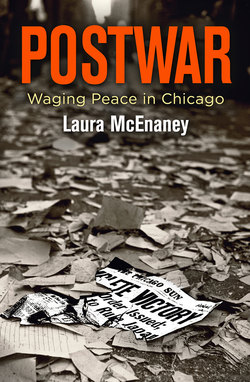Postwar

Описание книги
When World War II ended, Americans celebrated a military victory abroad, but the meaning of peace at home was yet to be defined. From roughly 1943 onward, building a postwar society became the new national project, and every interest group involved in the war effort—from business leaders to working-class renters—held different visions for the war's aftermath. In Postwar , Laura McEnaney plumbs the depths of this period to explore exactly what peace meant to a broad swath of civilians, including apartment dwellers, single women and housewives, newly freed Japanese American internees, African American migrants, and returning veterans. In her fine-grained social history of postwar Chicago, McEnaney puts ordinary working-class people at the center of her investigation. What she finds is a working-class war liberalism—a conviction that the wartime state had taken things from people, and that the postwar era was about reclaiming those things with the state's help. McEnaney examines vernacular understandings of the state, exploring how people perceived and experienced government in their lives. For Chicago's working-class residents, the state was not clearly delineated. The local offices of federal agencies, along with organizations such as the Travelers Aid Society and other neighborhood welfare groups, all became what she calls the state in the neighborhood, an extension of government to serve an urban working class recovering from war. Just as they had made war, the urban working class had to make peace, and their requests for help, large and small, constituted early dialogues about the role of the state during peacetime. Postwar examines peace as its own complex historical process, a passage from conflict to postconflict that contained human struggles and policy dilemmas that would shape later decades as fatefully as had the war.
Отрывок из книги
Politics and Culture in Modern America
Series Editors: Margot Canaday, Glenda Gilmore, Michael Kazin, Stephen Pitti, Thomas J. Sugrue
.....
They had a point. World War II was over. But its effects continued. In a 1948 case about the detention of a German citizen, the Supreme Court laid the rhetorical groundwork for what Chicago tenants knew already from experience—that “war does not cease with a cease-fire order.” That same year, in a rent control case that went all the way to the Supreme Court, a landlord argued that “wartime” should be more narrowly defined, otherwise a nation’s war powers could reach too far and last too long. The court disagreed, holding that war legislation “does not necessarily end with the cessation of hostilities,” citing the housing crisis as an example of how “the evils which have arisen from [war’s] rise and progress” could far outlast the war itself.43
But Chicago landlords lived by a different clock: the war was plainly over and any extension of controls was government overreach. As they saw controls on food, tires, and cars disappear, they began to wonder why they were the only ones sacrificing. As one OPA administrator observed, “there is a growing feeling of bitterness that they are being discriminated against.”44 This may help us understand why Le Pierres, Mertke, Brugger, and the La Dolces were not only repeated but self-righteous offenders. After all, what was the patriotic rationale for self-sacrifice now that the war was over? Why should they “hold the line on prices!” as the slogan went, when other sellers were jacking them up—and profiting nicely from it?
.....
